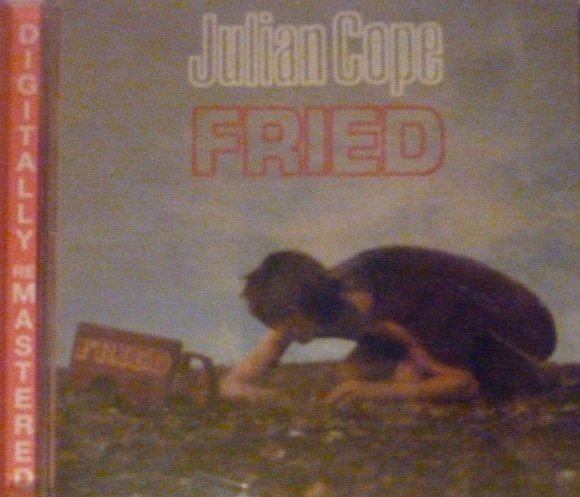Purchased at Rough Trade East, November 2008

Any album that boasts a cover on which its creator is depicted playing with a dinky toy with only a giant tortoise shell to shield him from the elements must be worth owning, right? This, pretty much down to the question mark, describes my thought process as I handed over the cash for this most frustrating album. I’ll be frank with you; I hadn’t gone into Rough Trade East to buy anything, I was waiting for somebody whose no-show inevitably resulted in me becoming five pounds poorer.
I don’t regret buying Fried– for all its faults, it contains some great songs- but sometimes it’s simply painful to listen to Julian Cope wilfully committing career suicide. Reynard the Fox, for example, starts off as a psychedelic tour de pop complete with anthropomorphic narration and a titanium-strengthened chorus, promising to be your new favourite song. Naturally, Cope cuts off his nose to spite his face by letting it descend into a feedback-heavy sub-Jim Morrison warble about the evils of fox-hunting. You want to strangle him not only for ruining your day, but also for effectively pissing away any chance of ever becoming the cult popstar he so demonstrably should have been.
The potential hits on Fried are so gleefully sabotaged that you begin to suspect this was his plan all along. Sunspots is maimed by an annoying and completely arbitrary recorder solo of all things, while Holy Love is let down by a production so thin that it sounds more like the work of an informal sixth-form Julian Cope tribute band than the man himself. It all makes me want to go back to 1984 to slap him in the face and say: ‘Come on, Julian, surely the Teardrop Explodes didn’t fall apart for nothing? GET A GRIP ON YOURSELF!’
Still, at least he had the good judgement not to tamper with the less radio-compatible songs. Bill Drummond said is an addictive absurdist singalong which finds the eponymous provocateur and future KLF member breaking into Cope’s garden, “sniffing round his coats”, and then, as one does, strangling his girlfriend. This perhaps unsurprisingly encouraged Drummond to record a song called Julian Cope is Dead (“I shot him in the head”); the Sweet Home Alabama* of 1980s indie-pop? Um, probably not.
Elsewhere, Laughing Boy is a fragile ballad which somehow anticipates the popularity of the Fleet Foxes without being unlistenable; in the same vein is Me Singing, which would have been perfect for the Teardrops’ second album had it had the more sympathetic production it deserved. Best of all is Search Party, one of the few records made in the 1980s that can honestly be described as “spooky” without either being either laden with ghoulish synth effects or utter pretentious drivel. The chorus is, for want of a better term, rather gorgeous- all fluttery classical guitar and recorder, this time in the right context.
“Say what you like about him, but he’s never boring”- that’s the cliché about Julian Cope. I don’t agree; I find his ritual massacres of potentially great songs more tiresome than a toddler who repeatedly shits his nappy five minutes after it’s been changed. The I’m crazy, me schtick may have looked “subversive” in the ’80s, but it sure as hell doesn’t wash now. Listening to Fried again makes me want to go into Law, purely so that I can convene a court for retrospective crimes against pop culture. Julian Cope would, under my sentencing at least, be condemned to work in hard-labouring partnership with Simon Cowell for five years as a punishment for wanton and obstructive acts of wackiness committed on various occasions over the 1980s. Justice would be done, and we’d have a potentially hilarious reality TV show into the bargain, too.
*A terrible song by Lynyrd Skynyrd recorded in response to Neil Young’s equally shit Southern Man. As if I needed to mention it…
SELECTED HIGHLIGHTS: Bill Drummond Said, Laughing Boy, Search Party
 I will return to this, but as you can probably detect from my last post, I’m a bit up against it today. I watched Help! last night, and wanted to listen to it. Sadly, I don’t own the album, so this’ll have to do. Can’t complain about that- have you ever heard Flying? No-one takes any notice of it, but I think it’s one of my favourite Beatles songs.
I will return to this, but as you can probably detect from my last post, I’m a bit up against it today. I watched Help! last night, and wanted to listen to it. Sadly, I don’t own the album, so this’ll have to do. Can’t complain about that- have you ever heard Flying? No-one takes any notice of it, but I think it’s one of my favourite Beatles songs.






